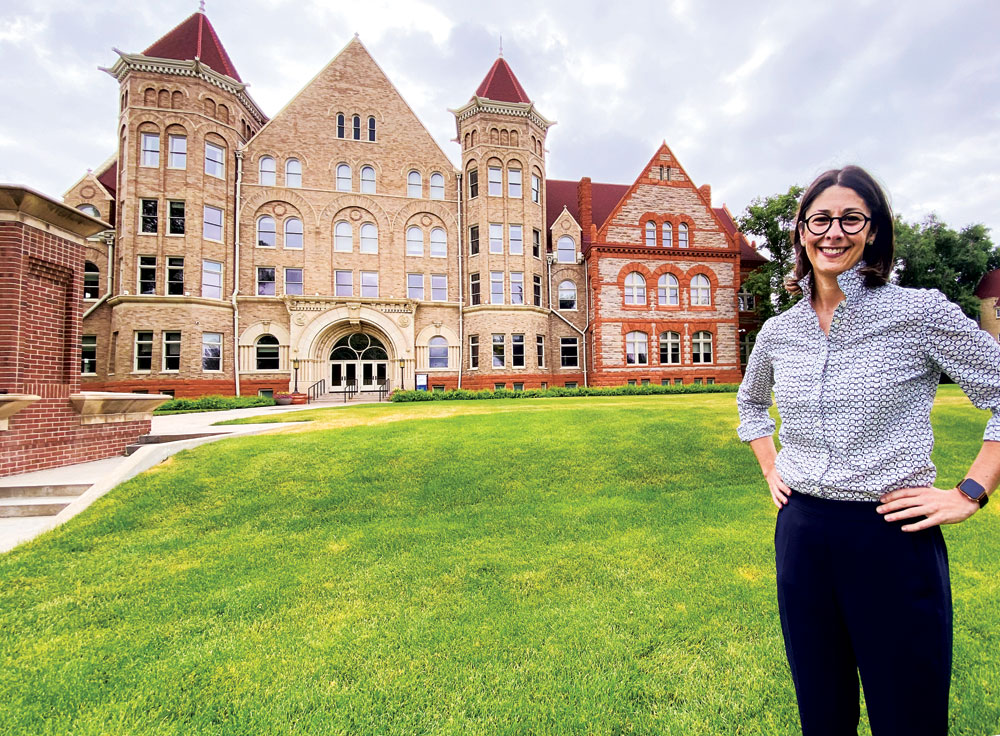
Head of St. Elizabeth’s School Adriana Murphy is pictured in front of Centennial Hall on the former Johnson & Wales campus. The Episcopal school, one of seven organizations partnering to reimagine the campus, will start classes there in August. Front Porch photo by Christie Gosch
![]()
An innovative partnership between an urban conservation group, Denver School of the Arts (DSA), two low-income housing organizations, a culinary incubator, and a private K-8 school will transform the Johnson and Wales campus in east Denver over the next twelve months. The unusual arrangement emerged after Johnson and Wales University announced last summer that it was closing its Denver campus.
Angelle Fouther, with the Urban Land Conservancy (ULC), said soon after that announcement her organization was approached by officials from the Denver Housing Authority and Denver Public Schools because they were interested in acquiring several buildings but couldn’t afford to buy the entire 25-acre campus. The three entities decided to partner together to put in a bid. “We were one of three finalists and the only non-profit. The two competing bids were looking at redevelopment and possibly demolishing the campus. That became part of our motivation to make this thing work. We wanted to serve the community by preserving the campus,” said Fouther.
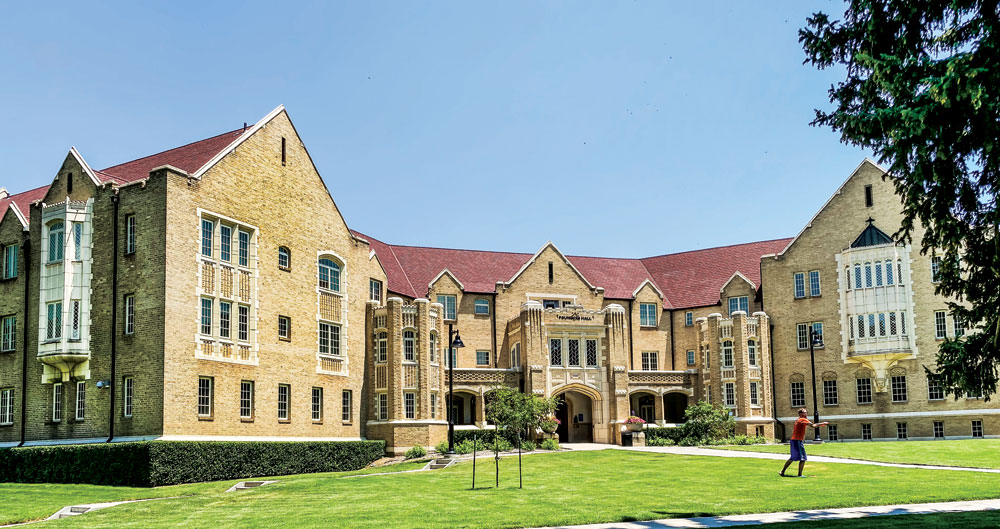
Historic Founders Hall served as a dormitory for Johnson & Wales students. It will be transformed into 1-,2-, and 3-bedroom apartments for low-income families and will be managed by Archway Communities, a non-profit group that provides housing, food security and supportive services. Front Porch photo by Steve Larson
![]()
The ULC bid of $62 million was accepted and went under contract in February. Since then, the coalition of partners has expanded to include Archway Communities, St. Elizabeth’s School and the Kitchen Network. All of the partners say they are excited by the possibilities of how the campus will be transformed.
DSA principal Anthony McWright says the acquisition of four additional buildings will allow the school to expand and serve greater numbers of students, particularly students of color. “I’m a child of the arts. The arts changed my life, and I want to be able to create more access to arts classes for more students in the Denver metro area.” Currently, 1,100 students are enrolled at the school. McWright hopes eventually to expand that by 800-1,200 additional students. During the next several months, he will seek input from teachers, students, and the community about how to organize a larger school. One idea is to house grades 6-8 in the school’s current building, and the high school in the newly acquired buildings. “Part of our discussions will be how to make this a real community hub. What programs can we offer after school? During the summer? How can we partner with other arts organizations?” McWright says the plan is have the new buildings ready for the 2022-2023 school year.
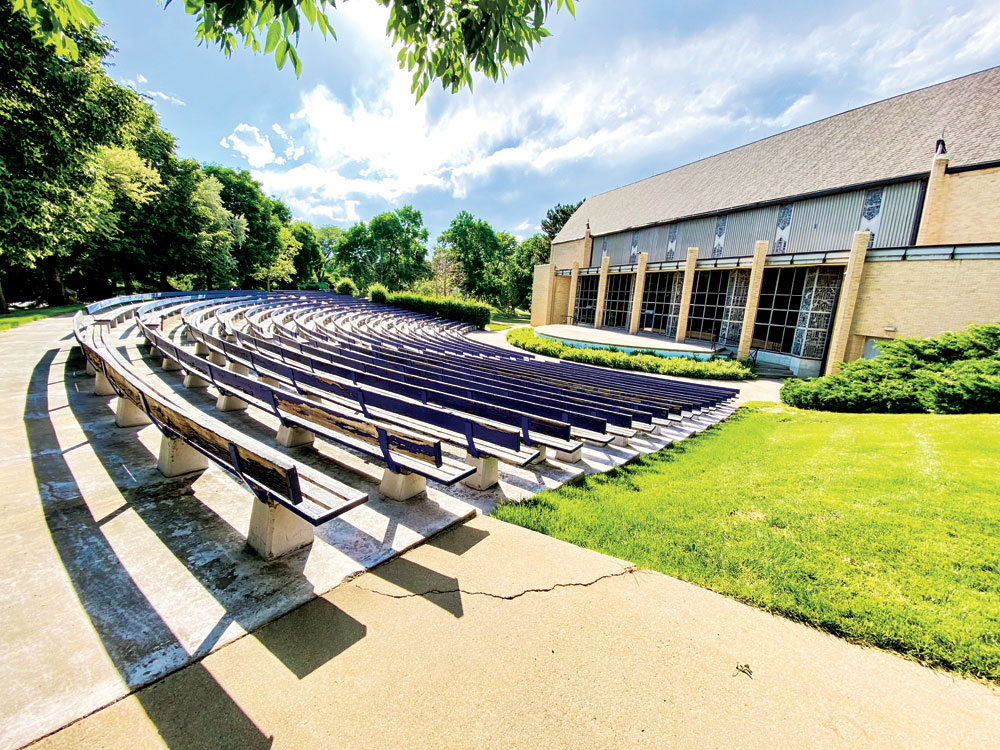
Anthony McWright, principal of the Denver School of the Arts, hopes to use the Johnson & Wales’ outdoor amphitheater for events such as Shakespeare in the park and other theatrical and musical productions. Front Porch photo by Steve Larson
![]()
Working at a smaller scale, but on a more rapid timetable, St. Elizabeth’s School hopes to open its doors to students in just two months. Currently located at 23rd Ave. and Gaylord Streets, the school will take over three floors of the old Colorado Women’s College Building. The school has an enrollment of 141 students, with 40 percent low income and 50 percent students of color. Adriana Murphy, head of school, says the Johnson and Wales campus will allow the school to grow its enrollment while also expand its programming. “We think this will be transformative for us and hopefully the neighboring community as well. We hope to partner with the Kitchen Network and the School of the Arts to offer new opportunities. Maybe we can have reading programs for our youngest students partnering with people living in senior housing. The possibilities seem endless.”
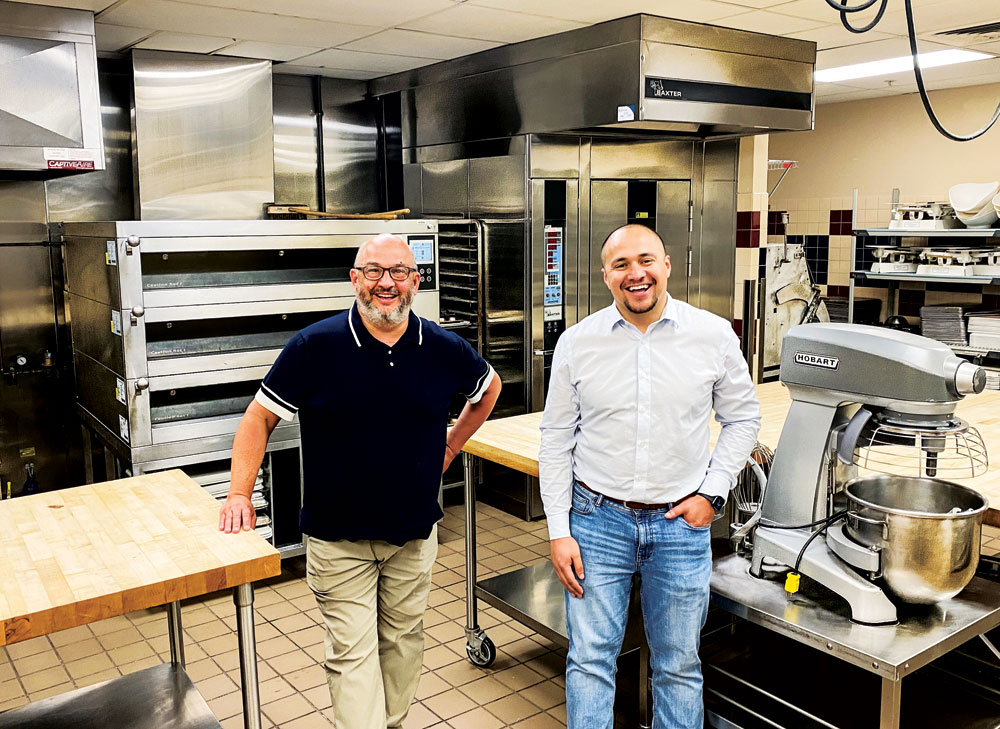
Former Johnson & Wales Culinary Dean Jorge de la Torre (left) and BuCu West Executive Director Jose Esparza are pictured in one of the commercial kitchens that will be available for caterers and small businesses. Front Porch photo by Christie Gosch
![]()
Six dormitories on the existing campus will be transformed into low-income housing. Two of the buildings will be managed by the Denver Housing Authority (DHA) for low-income seniors. Ryan Tobin, DHA’s chief real estate investment officer, says the agency hopes to create 72 one-bedroom apartments in the historically significant buildings. Although many regulatory hurdles, accessibility issues, and building codes have to be sorted out, “we’re jumping in with both feet,” says Tobin. “I’d love to say that we could have apartments ready by the end of the year.”
The other four dormitories will be managed by Archway Communities, a non-profit organization that provides affordable housing, food security, and supportive social services. It currently has nine communities in the Denver area. It plans to create approximately 150 apartments for low-income families on the campus, which will include 1, 2, and 3-bedroom units. Archway also hopes to be able to create some retail spaces on the ground floor of the dormitories—perhaps a coffee shop and a small market to serve residents. CEO Sebastian Corradino says the Johnson and Wales project was a once-in-a-lifetime opportunity. “Everyone knows how crazy the real estate market is right now. For us to be able to offer affordable housing in this neighborhood, partnering with schools, partnering with job training programs, it’s just incredible. It’s very exciting.” Archway hopes to utilize affordable housing and historic building tax credits to help with funding. The buildings likely won’t be ready for occupancy until the spring of 2023.
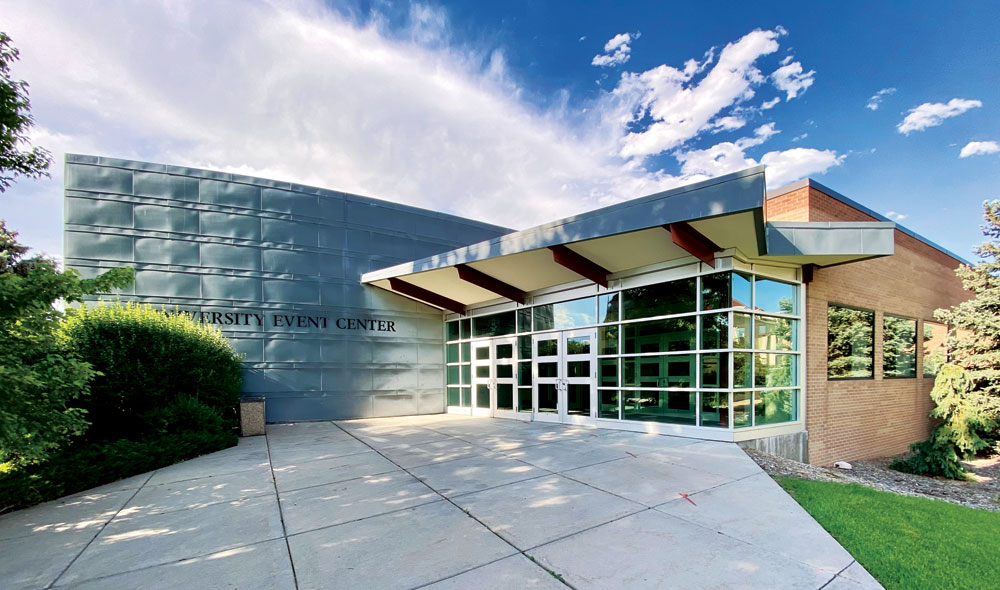
The former University Events Center is one of four buildings on the former Johnson & Wales campus that the Denver School of the Arts will use to expand enrollment by 800-1200 additional students. Front Porch photo by Steve Larson
![]()
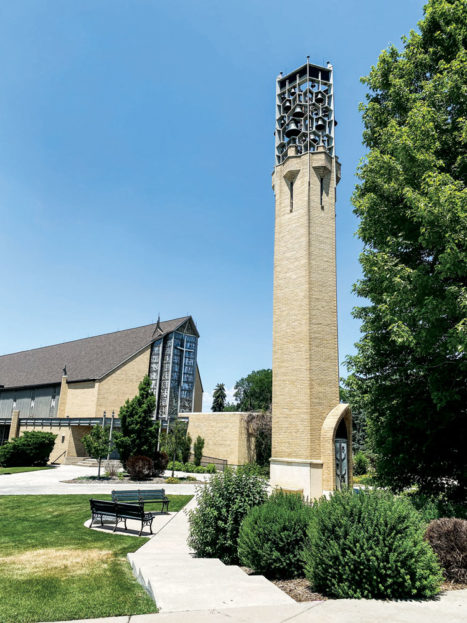
The former chapel on the Johnson & Wales campus will be converted into a performance space for the Denver School of the Arts. Front Porch photo by Steve Larson
The Kitchen Network and BuCu West will take over two Johnson & Wales culinary buildings to provide job training, commercial kitchens for caterers and food trucks, and even a microbiology lab to do food testing for product development. The Kitchen Network, which currently serves 300 small businesses at its southwest Denver location, will keep that facility in operation, but the Johnson & Wales campus allows it to expand. “We are interested in growing to serve more small businesses, while also focusing more on education. We see a gap with a lot of entrepreneurs who want to get more formal culinary training, but they can’t afford it. So we want to bring that training to them,” says Jose Esparza, executive director. The Kitchen Network has hired Jorge de la Torre, who served as the Dean of Culinary Education at Johnson & Wales for nearly 20 years, to lead that education effort. Esparza says the new facilities will also allow them to provide a dining facility, which could be used by the residents living on the campus, as well as the surrounding neighborhood. “This is a great opportunity to serve the community. In addition to the dining hall, we’re hoping to have a retail shop, and maybe even a farmers market so fresh produce is easily available to residents.”
The Urban Land Conservancy says it will soon begin holding community meetings to get more input on the transformation of the complex—including suggestions for a new name for the campus.


0 Comments